Moving the Play Outdoors
Innovation is one of Horizons’ core values, and in a year transformed by a global pandemic this concept has served every pillar of the organization.
Horizons’ Playspace Program is an exemplary example of this, supporting families experiencing homelessness in new and inventive ways. From hosting Virtual Playspace shifts for children living shelter, sending postcards with encouraging words to families, to assembling and delivering Playspace activity kits to shelters across the state, Playspace Activity Leaders (PALS) have done tremendous work to support Horizons’ mission throughout the COVID-19 crisis.
While shelter play is on hold, the team has explored ways PALs and children can play together safely and has developed new health and safety protocols. With social distancing and wearing facial protection mandated, the Playspace Program piloted an outdoor program in shelters throughout the state. For 6 weeks in the fall, PALs and children ages three and up in masks were able to play together out of doors – exploring play structures and participating in social distancing games.

“We know all of our PALs were really missing being in Playspace with the kids, and the pilot program was designed to help us test out how outdoor shifts could work in the springtime with new health and safety protocols in place when we’re able to roll them out across the state,” stated Shelby O’Sullivan, Volunteer Manager of the Greater Boston Playspace Program. “The pilot showed us that families wanted opportunities for their children and PALs to play together with safety in mind”
After a state-wide survey, the high interest level from PALs inspired the Playspace team to host informative Zoom meetings explaining the plan, protocols and safety measures ensuring volunteers, shelter staff and families had the resources needed to play safely outside.
During each shift, Playspace staff would have a cleaning kit with gloves, spare masks, and tissues accessible to the volunteers. Toys like hoola hoops, balls, blocks and other outdoor gear would be brought in a bin from the shelter and staff would disinfect each item before and after each shift.
“Typically, Playspace in shelters has two to four shifts per week but with new health protocols in place, we kept to two shifts for the outdoor pilot program. This way, we ensured 48 hours would pass between shifts and everything was properly disinfected,” Shelby explained. “The shifts were staggered depending on the shelter’s needs and staffing – either Monday/Wednesday or Tuesday/Thursday respectively.”
Five different shelters participated in the pilot and were located in Dorchester, Medford, Cambridge and North Hampton. Each shift had 3 to 5 volunteer PALs present, depending on the size of the outdoor space. The child-to-adult ratio ensured all protocols could be met for social distancing and gathering outdoors safely. Each space was thoroughly assessed by Playspace staff prior to the pilot to determine the right ratios. Volunteers and staff were asked to complete a health checklist two hours before their shift began and shelter staff would keep the Playspace team informed about the children and families participating in play that evening.
From fresh air and physical activity to social interaction, the benefits of playing outside are numerous. Staff and volunteers had expert guidance and training on how to keep children socially distanced and wearing facial protection as they exerted energy and had fun.
“PALs were really great at redirecting kids to engage with play structures, toys, or activities whenever we need to reset for social distancing,” Shelby shared. “We were happily surprised at how well the children did wearing masks, which they’ve been practicing at home, and we made it fun for them with bright-colors and kid-friendly designs.”
Included in the bins of sanitized toys was a Playspace activity booklet of social distance games the kids could play from 6 feet apart with the PALs. The team was also mindful to incorporate different areas of play in the activities and outdoor spaces, such as stringing letters up to support literacy development.
During a shift one of Horizons Playspace Program Managers, Alec Van Dyke, used the alphabet wall to spell out actions with the children such as J-U-M-P, jumping around as they giggled and played.


Beyond the educational benefits, the social aspect of play continues to be a key component of the program’s success.
“We’ve all been missing social interactions these past few months,” Shelby confided. “A wonderful part of our pilot program was watching friends reunite and new relationships form. We had these two boys in particular that lived in the same space, but didn’t seem to have interacted much before the outdoor shifts started. Over the course of the 6-week program we saw their friendship grow, and towards the end of the program they would shout with excitement when they saw their new friend coming out to play. They really looked forward to being together outside week after week to play, a feeling our PALs and staff can also relate to!”
The outdoor shift Playspace pilot successfully concluded in early November, and the staff is in planning mode for how to implement the program state-wide come springtime.
“We have running list with programs interested in returning with us in the spring, with over 50 identified as having a usable outdoor space for these types of shifts,” Shelby explained. “Our plan is to slowly and safely launch this program a few shelters at a time, assessing each space and training our network of PALs who are excited to bring outdoor shifts to children and families across the state.”
The momentum is already building through the Playspace program’s private social media group and newsletter, where each month staff includes an outdoor play idea and a countdown to spring.
“We are all excited to get back outdoors and play together once the weather gets nice,” Shelby concluded with a smile. “Most importantly, we are looking forward to doing so in a way that’s safe and enjoyable for everyone.”
This piece was written by Andrea Drag, a regular contributor to Horizons’ Blog.




